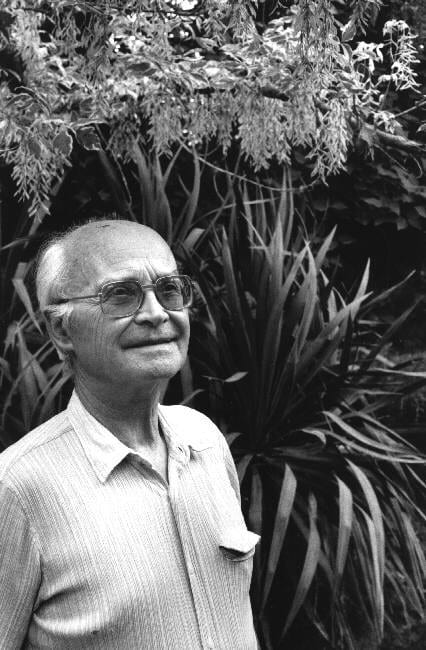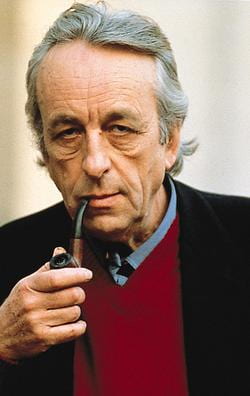by guest contributor Eric Brandom
The Western Society for French History meeting is always rewarding, and this year in Chicago did not prove an exception. “Searching for New Ground: Re-Evaluating the Theoretical Foundations of Politics and Economics in Postwar France,” a panel of graduate students at different phases of their work, is particularly worth highlighting here.
Alexander Arnold presented an essai at recovery of the rationalist historical epistemology of Gilles-Gaston Granger, especially his investigation into the conceptual foundations of economics, principally in his 1955 thesis Concept, structure et loi en science économique. Arnold began by sketching the widely noted postwar crisis of economics or, in the title of one important early statement, La crise de la pensée economique. What are the foundations of economics? What kind of a science is it? This, Arnold indicates, remained a problem not least because the study of economics was not institutionally centralized. It was conducted here as econometrics, there as social studies, and nowhere was a sustained investigation into its theoretical content carried out. In any case, no agreement could be found and no central institution emerged in which such agreement would be forged.
In this context then, we have Granger’s attempt at a rationalist historical epistemology of economics in the vein of Bachelard and Cavaillès. The bold move here is to transfer an historical epistemology developed with the natural sciences (and especially mathematics) as an object to the terrain of social science. The method would be to investigate the historical movement and development of concepts. Granger argued that only when the concepts of economics have been thus investigated and clarified would they become productive and mobile again. Arnold gives us the central example of equilibrium, which Granger traced back to ancient notions of two balanced physical forces. How is it possible to get between the individual instance of exchange and this larger metaphor of balanced forces, say supply and demand?
Arnold’s presentation was elegant, and I am convinced that we should read Granger. Two central questions occur to me. The first is that I would like to know a great deal more about the nature of this ‘crisis of economic thought’ that unfolded over the course of the 1950s. Why the crisis? Is the lack of institutional centralization a sufficient explanation? Are we coming down from Mont Pèlerin here? The legacy of fascist-era planned economies? And then, pointing toward my second question, there’s the other major claimant to being in possession of an economic science—the Communist Party. Even aside from the politics of economics and communism, does Granger not engage with the obvious theoretical interlocutor here, the Marxist tradition of critique of political economy? Arnold finished with a flourish: Granger may not be a major figure in the intellectual history of economics, but perhaps he should be—is—in the conceptual history of economics.
Luca Provenzano (a JHI blog contributor) suggested an unabashed ‘return to Althusser,’ although not to what is normally thought of as Althusserianism. Provenzano exploits the manuscripts relatively recently made available at IMEC (parts of which were published in PUF’s 1996 Sur la reproduction) to look again at Althusser’s famous 1970 essay on ISAs in La pensée. Out of the archive comes a much more pluralist and less straightforwardly pessimistic Althusser, one more willing to discuss the failures of ideology to successfully hail individuals, more interested in the competition between ideologies, their overlaps and conflicts. Provenzano is also interested in deepening our understanding of the context in which the essay appeared, and developed in this presentation arguments for the importance of three contexts: first, the institutional contexts of writing and publishing, here the relevant shift is from Maspero, a more broadly leftist publisher, to the PCF journal La pensée. Second is the ongoing political conflict between the PCF and the gauchiste students, some of them Althusser’s, for whom he was held responsible by the Communists. Third are the comments and objections made to Althusser’s earlier writings, or draft versions, by his students. Provenzano mentioned a fourth important context, Althusser’s illness, but prudently set it aside. I will simply mention here that, given Provenzano’s laudably dense approach to political context, it seems unavoidable if only at the most vulgar level of obliging Althusser to be periodically absent from Paris.
Provenzano argues that if we attend to the manuscripts, we can see Althusser elaborating a theory of ideology that, in its sensitivity to what I (not Provenzano and surely not Althusser) want to call human experience, comes to seem much more like a theory of social action, or practice. This is because ideology really does permeate everything, but is also not unified. So that ideologies compete and may well fail to ‘hail’ an individual into subject-hood. Provenzano argues that this work—transparently biographical in parts—was actuated by the specific political context. Althusser was torn between the PCF and the students. He wanted to support the students, to reconcile the students and the PCF, but in the end could not, and also could not abandon the PCF. So, says Provenzano, the moment closed and the manuscripts remained in the archive. I would like to hear more about the nature of this closure. Here in any case is an Althusser that E.P. Thompson might have hesitated to call (more or less) a theologian of Stalinism.
In 1975, the French educational system was subject to significant “modernizing” reforms, including a more unified early curriculum, fewer general requirements for those pursuing the scientific track, and a reduced role for philosophy in the lycée. This, indeed, is the world that Althusser criticized. Philosophers mobilized in different ways to defend themselves. David Sessions’ paper looks at how Jacques Derrida, together with GREPH (Le Groupe de Recherche sur l’Enseignement Philosophique), rejected the traditionalist defense of philosophy—and its “sacred” place in the curriculum—but also rejected the implied philosophy of “modernization.” Derrida’s historical starting point, nourished by a perhaps surprising engagement with sociology, for instance Bourdieu and Passeron on education and reproduction, was the recognition that philosophy had always been complicit, a prop to the established order, rather than a place somehow beyond politics. Conceptually, the beginning was to see that philosophy never argues against non-philosophy (as might at first appear to be the case in the reform), but against some other philosophy.
In his work with GREPH, Sessions tells us, Derrida argues that the 1975 reform represents scientism. Derrida is not anti-science, but against the essentially authoritarian modernizing ideology often associated with technoscience. Philosophy should not abandon the field of struggle (the state educational system), but should stay within it and remain critical. This would be a philosophy committed to understanding the institutional conditions of knowledge, whose practices would not be inherently subversive, perhaps, but which could open new possibilities. The position Derrida wished to occupy is a difficult one to maintain, and his attempt to do so should certainly be of interest to the humanities broadly in the contemporary Anglophone world. Sessions also suggests some historiographical consequences for attention to this part of Derrida’s work, first of all for answering questions about the political significance of deconstruction, although these writings also allow us to place Derrida together with certain contemporaries, Marxist theory, and more broadly the attempt to come to grips with changes in French society in the wake of 1968.
If I have understood Sessions’ account of Derrida’s critique of authoritarian technoscience correctly, it seems to me a critique leveled at a fundamentally modernist kind of modernization—that is, ideology flattening things out at the service of/by means of a centralized authority. Famously, it was the 1970s that saw Foucault move away from such an account of State power toward his analysis of neoliberalism as governmentality (we cut off the king’s head, now we must behead the State). We have Provenzano reminding us that Althusser was important for Foucault’s thinking here, and perhaps made some of the same moves away from monolithic ideology himself. I would love to hear what Provenzano’s Althusser has to say about Sessions’ Derrida. What did Althusser think about the reforms of the 1970s? Arnold argued that Granger sought in a more or less depoliticized way to put economics really in possession of its own concepts—is this the kind of critical/foundational work Derrida has in mind? Is it rather just the opposite?
Thomas Dodman’s comment was a model of the genre. For him the panel was evidence of a revival in intellectual history. Perhaps, Dodman suggested, it is a Koselleckian moment in which “concepts” matter most, but certainly all three papers gave an important place to context in actuating concepts or demanding work on them. Paris remains the scene, although the relevant documents seem mostly to be at IMEC in Caen or elsewhere now. I wonder if the increasing importance of IMEC, given its peculiar institutional position within the galaxy of French archives, will push intellectual historians of the later 20th century to think about the politics of their archives and subjects—what the archive itself reproduces and silences—as other sub-disciplines have done?
Eric Brandom is a James Carey fellow and visiting assistant professor in the department of history at Kansas State University. His book on Georges Sorel and the political thought of the Third Republic is in preparation. He maintains an academia.edu page, and also tweets @ebrandom.






November 16, 2015 at 3:24 pm
Eric Brandom offers a judicious summary of my conference presentation “Conflicted Subjects, Ideological Fractures: Althusser, May ‘68, and Theory.” Above all my research at IMEC responded to my impression that there were a number of conceptual variations going on between the 1969-1970 manuscripts of the late Marxist theoretician and the infamous La pensée essay. In a fashion that was avowedly (though perhaps traitorously) “Althusserian,” I tried to account for these oscillations using a concept I extracted from the manuscripts themselves: the “conflicted subject,” a “subject” located at the intersection of contradictory ideological tendencies and institutionalized material practices. No doubt this project contained a lot of inherent difficulties, but one of its promises (not totally unfulfilled, I hope) was to show that the oscillations in Althusser’s theories could be traced, at least in part, to various institutional dynamics in which his ‘theoretical practice’ was embedded. Although for the presentation I made much of the political context in activating Althusser’s multiple attempts to trace and retrace his theories of ideology after May and June 1968, I would not of course want to fully reduce the conceptual oscillations between his manuscripts and the published work to politics. Editorial interventions, intrinsic theoretical difficulties, and, yes, illness, played a role.
As Brandom notes, the Althusser I depict was much more minutely (even urgently) responsive to the shifting terrain of the après-Mai than many might have suspected and much less ‘coherent’ in his theoretical products than has been assumed. Though I am not exactly an admirer Althusser’s political stances, I would hesitate to denounce him as a ‘Stalinist’ or fully subscribe to any of parallel criticisms by his former students, themselves embedded in this history. I am not an expert on the debates within English Marxism about Althusserianism, but I wonder whether Thompson didn’t sometimes make significant concessions above and beyond his attempts to exclude, mark, or stigmatize his adversary. Part of what I initially found worthwhile about this project despite its ‘old-school’ style was the opportunity it offered to arrive at a more subtle interpretation not only of Althusser or French post-structuralism but of the “Althusser effect” in Western European intellectual life in the Sixties and Seventies. To bring in another contribution on our panel, part of this intellectual history involved an attempted overture by Althusser towards Jacques Derrida in the mid-Seventies, though this move was linked to a stubborn, even desperate Leninism.